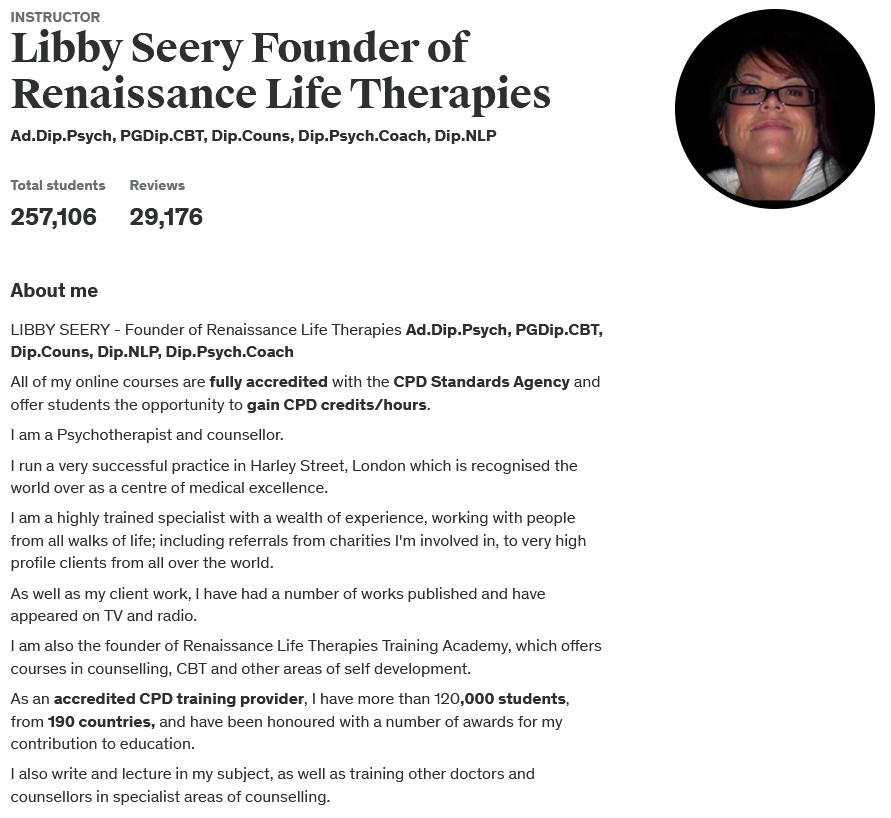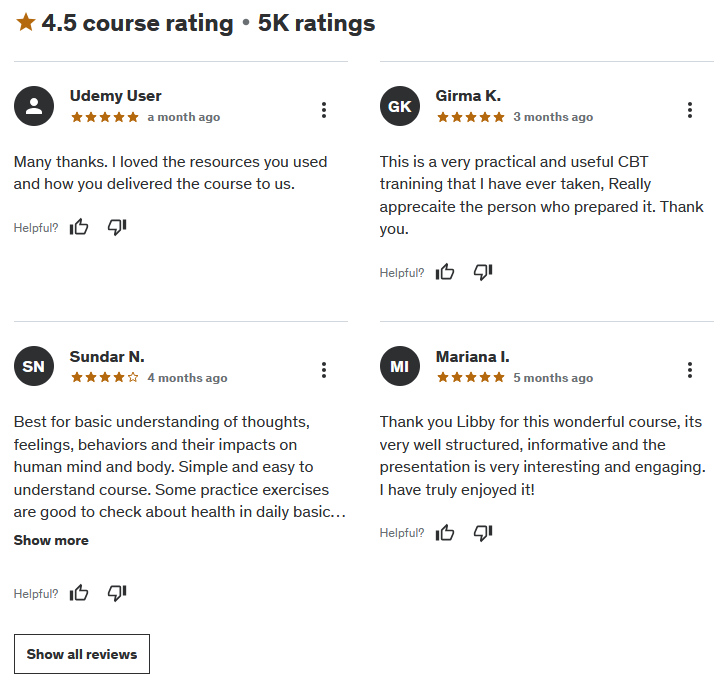Are you curious about Cognitive Behavioral Therapy (CBT) and how it can help you or your clients? If so, the “Introduction to CBT: Cognitive Behavioral Therapy” course on Udemy might be just what you need. This course promises to equip you with the skills to use CBT in various aspects of your life, helping you become your own counselor and CBT therapist. Let’s dive into what makes this course stand out and see if it lives up to its claims.
Instructor Reputation
When it comes to online courses, the instructor’s reputation can make or break the learning experience. In the case of the “Introduction to CBT: Cognitive Behavioral Therapy” course, you’re in excellent hands with Libby Seery at the helm. Let’s take a closer look at what makes her such a standout instructor.

Libby Seery is the founder of Renaissance Life Therapies, a well-regarded practice located on Harley Street in London. Harley Street is renowned worldwide as a hub of medical excellence, which speaks volumes about the caliber of professionals who operate there. Libby is a highly trained psychotherapist and counselor, holding multiple advanced diplomas in psychology, counseling, CBT, NLP, and psychological coaching. This extensive educational background equips her with a deep understanding of the subject matter, ensuring that the course content is both accurate and insightful.
But qualifications alone don’t make a great instructor. What truly sets Libby apart is her practical experience and dedication to her students. She runs a successful practice, working with clients from all walks of life, including high-profile individuals from around the globe and referrals from charitable organizations. This real-world experience means that she brings practical, applicable knowledge to her courses, which can be incredibly valuable for students looking to apply CBT techniques in their own lives or practices.
Libby’s commitment to education extends beyond her practice. She has published numerous works and has appeared on television and radio, sharing her expertise with a broader audience. She also lectures on her subjects and trains other doctors and counselors, demonstrating her role as a thought leader in the field of mental health and therapy.
On Udemy, Libby has a remarkable track record. With a 4.4 instructor rating from over 29,000 reviews and a student base of more than 257,000 across 24 courses, it’s clear that she is highly regarded by those who have taken her classes. Students frequently praise her approachable teaching style, comprehensive course content, and the supportive environment she fosters. Libby’s courses are fully accredited by the CPD Standards Agency, allowing students to gain CPD credits, which adds an extra layer of value for professionals looking to fulfill their continuing education requirements.
One of the standout features of Libby’s teaching approach is the support she offers. She is available to her students seven days a week, ensuring that help is always on hand when needed. This level of accessibility is rare in online education and can make a significant difference in the learning experience, particularly for complex subjects like CBT.
In summary, Libby Seery’s combination of extensive qualifications, practical experience, dedication to student support, and a proven track record makes her an outstanding instructor for this CBT course. Her reputation ensures that you’re learning from one of the best in the field, providing a strong foundation for your journey into Cognitive Behavioral Therapy.
Course Structure
A well-structured course is crucial for effective learning, especially in an online environment where self-discipline and organization are key. The “Introduction to CBT: Cognitive Behavioral Therapy” course is meticulously designed to provide a comprehensive and engaging learning experience. Let’s break down the course structure in detail.

The course kicks off with an overview of what CBT is, who uses it, and the various applications it has. This foundational knowledge is essential as it sets the stage for the more detailed topics covered later. By understanding the basics, you’ll be better prepared to delve into the more complex aspects of CBT.
One of the core strengths of this course is its modular design, which is broken down into easily digestible sections. Each module builds on the previous one, reinforcing key concepts and ensuring a logical progression of learning. This structure helps students to gradually absorb and retain information without feeling overwhelmed. The use of clear, concise language and practical examples makes even the more challenging concepts accessible.
The course covers a wide range of topics, starting with the principles of CBT and moving on to understanding the CBT triangle, recognizing emotions, and identifying thoughts, feelings, and behaviors. Each topic is explored in depth, providing students with a thorough understanding of the subject matter. The course also delves into more specific areas such as negative automatic thoughts, thinking traps, and negative cycles. By learning to recognize and challenge these patterns, students can develop healthier thought processes and behaviors.
Practical application is a key focus of this course. It’s not just about theoretical knowledge; the course includes numerous exercises designed to help students apply what they’ve learned in real-life situations. This hands-on approach is particularly beneficial for those looking to use CBT techniques in their personal lives or professional practice. By working through these exercises, students can gain practical experience and build confidence in their CBT skills.
The inclusion of over 50 downloadable resources is another significant advantage. These materials provide additional support and can be used for further study or reference. While a printer is recommended for those who prefer physical copies, it’s not essential, as all materials can be accessed digitally. This flexibility allows students to tailor their learning experience to their preferences and needs.
A standout feature of this course is the support available from Libby Seery. She offers unparalleled support to her students, being available seven days a week. This level of accessibility is rare in online courses and provides a valuable safety net for students who may have questions or need extra help with the material. Whether you prefer to work independently or need more guided support, this course accommodates both learning styles.
The course is also designed with flexibility in mind. There is no specific time frame for completion, allowing students to work at their own pace. This self-paced approach is ideal for busy professionals or those juggling multiple commitments. Students are encouraged to take breaks after certain lectures to ensure they have the time and space to complete the exercises fully. This thoughtful design helps to prevent burnout and promotes a more effective learning experience.
In conclusion, the “Introduction to CBT: Cognitive Behavioral Therapy” course is structured to provide a comprehensive, engaging, and flexible learning experience. With a logical progression of topics, practical exercises, ample resources, and exceptional instructor support, it equips students with the knowledge and skills they need to effectively apply CBT in their personal and professional lives. Whether you’re a beginner or an experienced practitioner, this course offers valuable insights and practical techniques to enhance your understanding and use of Cognitive Behavioral Therapy.
Content Quality
Content quality is a critical factor when evaluating an online course, and the “Introduction to CBT: Cognitive Behavioral Therapy” course certainly delivers in this aspect. Let’s delve into the specifics that make the content of this course both rich and effective.

One of the first things you’ll notice about this course is its thoroughness. The curriculum is designed to cover the full spectrum of CBT, starting with the basics and progressing to more advanced topics. This structured approach ensures that learners of all levels, from beginners to seasoned practitioners, can benefit from the material. The course begins by defining what CBT is and its various applications. This foundational knowledge is crucial, as it sets the context for everything that follows.
As you move through the course, you’ll explore the principles of CBT in greater depth. The course provides a detailed explanation of the CBT triangle, which is essential for understanding the interrelationship between thoughts, feelings, and behaviors. This section is particularly well-explained, with clear diagrams and examples that make complex concepts more digestible. The clarity with which these foundational principles are presented is one of the course’s standout features.
The course content is not just theoretical; it’s highly practical. Throughout the modules, you’ll find numerous exercises designed to help you apply CBT techniques to real-life situations. These exercises are varied and engaging, encouraging you to think critically and reflect on your own experiences. By practicing these techniques, you can start to recognize and challenge negative thought patterns, ultimately leading to healthier behaviors and emotional responses. The practical application of CBT principles is a major strength of this course, as it helps bridge the gap between theory and practice.
Another highlight of the content quality is the inclusion of specific modules dedicated to understanding and managing emotions. These sections delve into the nuances of emotional recognition and regulation, providing valuable tools for both personal and professional use. The course covers common emotional challenges, such as anxiety and depression, and offers practical strategies for addressing these issues. The section on anxiety, for instance, includes bonus lectures that provide additional insights and techniques, further enriching the learning experience.
The course also addresses negative automatic thoughts and thinking traps in a comprehensive manner. These are common pitfalls that can hinder personal growth and development. By learning to identify and challenge these patterns, you can develop a more positive and constructive mindset. The strategies provided are practical and easy to implement, making them accessible to learners at all levels.
In addition to the core content, the course offers over 50 downloadable resources. These materials are a valuable addition, providing supplementary information and exercises that you can use to reinforce your learning. Whether you prefer to study digitally or print out materials for a more hands-on approach, these resources are designed to enhance your learning experience. They serve as a useful reference that you can return to even after completing the course.
Libby Seery’s teaching style also contributes significantly to the content quality. Her explanations are clear and concise, and she uses real-life examples to illustrate key points. This practical approach helps to demystify complex concepts, making them more relatable and easier to understand. Libby’s passion for the subject is evident throughout the course, and her commitment to student support ensures that you always have help available when needed.
In summary, the content quality of the “Introduction to CBT: Cognitive Behavioral Therapy” course is exceptional. It offers a comprehensive, practical, and engaging learning experience that equips you with the knowledge and skills needed to apply CBT principles effectively. Whether you are looking to enhance your personal growth or expand your professional toolkit, this course provides valuable insights and practical techniques that can make a significant difference in your life.
Overall Course Rating – 9/10
The “Introduction to CBT: Cognitive Behavioral Therapy” course deserves a solid rating of 9 out of 10. This rating reflects the course’s comprehensive curriculum, practical application, and the exceptional support provided by the instructor, Libby Seery.

One of the key factors contributing to this high rating is the course’s accessibility. It is designed to cater to a wide range of learners, from complete beginners to experienced practitioners. The flexible structure allows you to work at your own pace, making it ideal for busy professionals or those juggling multiple commitments. The absence of a strict completion timeline means you can take breaks as needed, ensuring that you can fully absorb and apply the material without feeling rushed.
The course’s thoroughness is another reason for its high rating. It covers all essential aspects of CBT, from foundational principles to advanced techniques. Each module builds logically on the previous one, creating a cohesive and well-rounded learning experience. The inclusion of practical exercises and over 50 downloadable resources further enhances the course’s value, providing ample opportunities for hands-on practice and reinforcement of key concepts.
Instructor support is a standout feature of this course. Libby Seery’s availability seven days a week ensures that you always have help when you need it. Her approachable teaching style, combined with her extensive experience and qualifications, makes the learning process engaging and enjoyable. Students consistently praise her for her clarity, responsiveness, and dedication, which significantly enhances the overall learning experience.
One minor area for improvement, which prevents the course from achieving a perfect 10, is the need for more visual aids. While the content is clear and well-explained, incorporating additional visual resources could benefit learners who rely heavily on visual learning styles. This enhancement would make the course even more accessible and engaging, especially for complex topics that could benefit from visual representation.
Despite this minor drawback, the course excels in delivering a comprehensive and practical introduction to CBT. It equips you with the skills to identify and change negative thought patterns, recognize and manage emotions, and apply CBT techniques in various contexts. Whether you’re looking to improve your personal well-being or enhance your professional skills, this course provides valuable tools and insights.
In conclusion, the “Introduction to CBT: Cognitive Behavioral Therapy” course earns a well-deserved 9 out of 10. It offers a rich and engaging learning experience, backed by a highly qualified and supportive instructor. The course’s comprehensive content, practical application, and exceptional support make it a worthwhile investment for anyone interested in learning about CBT. Give it a try and see how it can transform your approach to personal development and therapy.



